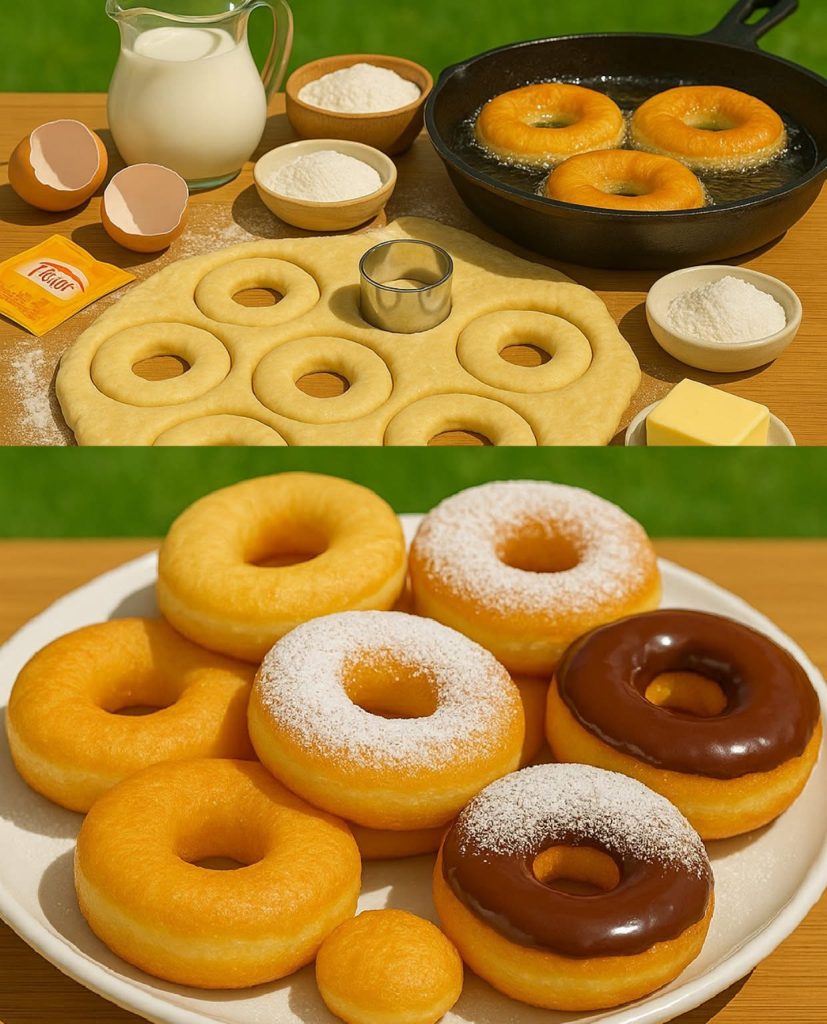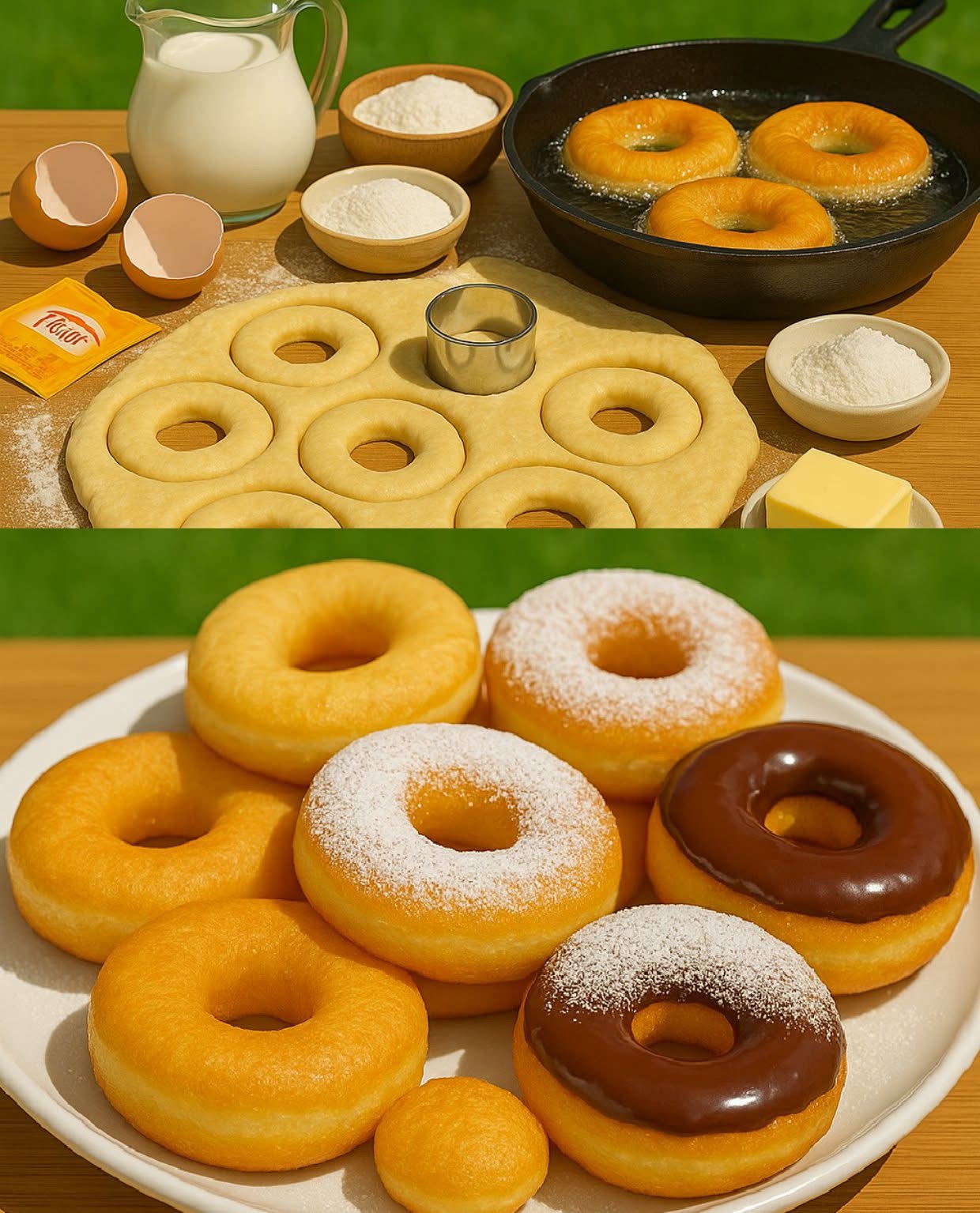Classic Homemade Donuts

Introduction
Who can resist the golden, pillowy charm of a freshly fried donut? Whether glazed, dusted with sugar, or dipped in chocolate, donuts are a universal comfort. This recipe walks you through making traditional yeast-raised donuts from scratch — the kind that melt in your mouth and make your kitchen smell like a dream.
History of Donuts
Donuts date back to early Dutch settlers in North America who made “olykoeks” (oily cakes) by frying dough in pork fat. These round pastries often didn’t cook evenly in the center, so they were sometimes filled with nuts — giving rise to the name dough-nut. By the 19th century, a New England ship captain’s mother, Elizabeth Gregory, popularized them with nutmeg, cinnamon, and lemon zest. The classic ring shape we know today was reportedly created by her son using a ship’s pepper box to punch out the center for more even cooking.
Ingredients
Yeast Dough:
- 3 ½ cups all-purpose flour
- 1 cup whole milk (warm, around 100°F/38°C)
- ¼ cup granulated sugar
- 2 ¼ tsp active dry yeast (1 packet)
- ¼ cup unsalted butter (softened)
- 2 large eggs
- ½ tsp salt
- 1 tsp vanilla extract
For Frying:
- Vegetable oil (for deep frying)
Toppings (optional):
- Powdered sugar
- Chocolate glaze
- Cinnamon sugar
- Classic sugar glaze (1 cup powdered sugar + 2 tbsp milk + ½ tsp vanilla)
Instructions and Method
1. Activate the Yeast
In a bowl, combine warm milk, 1 tbsp sugar, and yeast. Let it sit for 5–10 minutes until frothy.
2. Make the Dough
In a large mixing bowl, whisk together the flour, remaining sugar, and salt. Add the eggs, softened butter, vanilla extract, and yeast mixture. Mix and knead for about 10 minutes until smooth and elastic. You can use a stand mixer with a dough hook or knead by hand.
3. First Rise
Cover the dough with a damp cloth or plastic wrap. Let it rise in a warm place for 1–2 hours, or until doubled in size.
4. Roll and Cut
Punch down the dough, roll it out on a floured surface to ½-inch thickness, and cut using a donut cutter (or a glass and bottle cap for DIY cutters). Save the centers for donut holes!
5. Second Rise
Place the donuts on parchment-lined trays. Cover and let rise again for 30–45 minutes.
6. Fry the Donuts
Heat oil in a heavy pan (about 2 inches deep) to 350°F (175°C). Fry donuts 1–2 minutes per side until golden. Drain on paper towels.
7. Add Toppings
While warm, dust with powdered sugar, dip in glaze or chocolate, or toss in cinnamon sugar.
Formation
Donuts are typically formed into rings using a circular cutter. This allows even frying and a soft, fluffy center. Alternatively, you can fill round donuts with custards or jams after frying. The holes can also be fried for tasty donut bites.
Lovers of Donuts
- Kids – Adore their soft texture and sweet toppings.
- Adults – Love nostalgic bites from their childhood.
- Coffee Lovers – Donuts are best friends with a hot cup of joe.
- Homemade Treat Seekers – Nothing beats the fresh taste of donuts made with love.
Benefits (in moderation)
- Mood Booster: The sweet treat triggers endorphins.
- Family Bonding: Making donuts together creates memories.
- Energy Kick: The sugars and carbs offer quick energy.
- Customizable: Toppings and flavors can be tailored to taste.
Nutrition (Per Plain Donut – Approx.)
- Calories: 220 kcal
- Protein: 4g
- Carbohydrates: 30g
- Fat: 10g
- Sugar: 6g
- Fiber: 1g
(Toppings like chocolate or glaze will add extra calories and sugar.)
Conclusion
Homemade donuts are more than just fried dough — they’re edible joy. From the history steeped in tradition to the hands-on process of making and forming them, donuts are a labor of love worth every bite. Whether you make them for a celebration, weekend treat, or just because — one thing is certain: they disappear fast.
For the Donut Lovers
To every donut lover out there: May your glaze be glossy, your centers fluffy, and your kitchen always smell like vanilla and dreams. Share them with those you love or savor one all to yourself with a cozy drink. There’s no wrong way to enjoy a donut — just make sure there are plenty.
